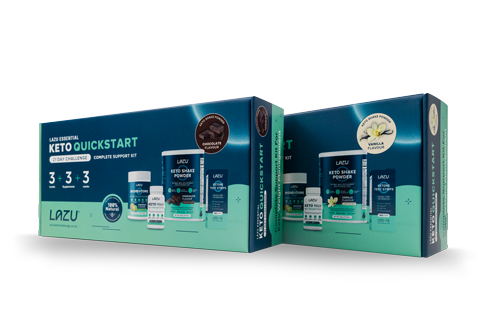
Menopause is a natural phase in a woman’s life that brings various changes and challenges. During this time, hormonal fluctuations can lead to symptoms like hot flashes, mood swings, weight gain, and decreased metabolism.
There are different ways to help decrease menopause symptoms. Diet often plays an important role in this. Many women turn to different approaches to manage these symptoms. One method that has gained popularity is the keto diet.
In this blog post, we will explore the potential benefits of the keto diet in decreasing symptoms of menopause, and we will dig deep into discussing important considerations for women entering this stage of life.
Understanding Menopause
Menopause typically occurs between the ages of 45 and 55, marking the end of a woman’s reproductive years. It is characterized by a decline in the production of estrogen and progesterone, leading to various physical and emotional changes.
While every woman experiences menopause differently, common symptoms include hot flashes, night sweats, mood swings, fatigue, and weight gain. One of the consequences of menopause is that it puts women at risk for other conditions, such as osteoporosis and high cholesterol levels.
What Is The Keto Diet
The ketogenic diet, often referred to as the keto diet, is a low-carb, moderate-protein, and high-fat eating plan.
It focuses on drastically reducing carbohydrate intake and replacing it with healthy fats. By doing so, the body enters a state of ketosis, primarily burning fat for fuel instead of relying on carbohydrates.
This metabolic adaptation leads to increased ketones, which has shown several benefits, including weight loss, increased energy, and improved mental clarity.
Benefits of Keto during Menopause
There are several benefits to following a keto diet while in menopause.
- Weight management. One common problem most women have while entering menopause is increased weight and trouble losing it. The keto diet’s low-carbohydrate and high-fat nature can aid weight management since it helps improve insulin sensitivity and promote fat burning. In addition, the diet helps control hunger and cravings, which can be particularly beneficial during hormonal fluctuations.
- Hormonal balance. The keto diet’s impact on insulin levels may help regulate other hormones as well. When sugar levels are more stable, it can also help stabilize estrogen and progesterone levels, reducing the severity of hormonal imbalances. As a result, it can lead to a decrease in menopausal symptoms.
- Increased energy and mental clarity. Many women experience fatigue and foggy brain during menopause. The keto diet provides a steady supply of energy by utilizing fat stores, leading to improved physical and mental performance. In some cases, some women also have reported improved focus and mental clarity while on the keto diet.
- Reduced inflammation. Inflammation levels tend to rise during menopause, contributing to various symptoms. When you follow a keto diet that focuses on wholeand unprocessed foods, along with healthy fats (avocado, nuts, seeds, and olive oil), it can help reduce inflammation markers and help reduce menopause symptoms.
Also Read: How Exogenous Ketones Can Improve Your Health
Drawback Of A Keto Diet
While the keto diet shows promise for managing menopausal symptoms, there are some drawbacks to this diet. So, before you make any changes to your diet, it is always crucial you consult with a health professional to determine if this is the right type of diet for you based on existing medical conditions, needs, and preferences.
With that said, there are some drawbacks of the keto diet you need to be aware of.
- Decreased nutrient intake. Restricting carbohydrates may affect nutrient intake, so it’s vital to focus on consuming nutrient-dense foods and consider supplementation if necessary. Make sure you eat at least three different coloured fruits and vegetables throughout the day to get different nutrients.
- Electrolyte imbalance. The keto diet can cause increased water loss and electrolyte imbalances. Adequate hydration and proper electrolyte supplementation are essential for overall well-being. One common symptom of electrolyte imbalance is the known “keto flu.” Here, you might experience symptoms such as fatigue, foggy brain, nausea, and headaches. To prevent any undesired side effects, supplement with a keto-friendly electrolyte.
- Less sustainable lifestyle. The keto diet requires a significant dietary shift and may not be suitable for everyone long-term. It’s essential to consider whether it fits your lifestyle, food preferences, and overall health goals. Most people have a hard time in social activities. Due to this constant struggle, most people end up living this lifestyle. Remember that the best results are seen when you make lifestyle changes, not short-term changes.
Other Nutritional Tips For Menopause
Here are other nutritional tips that are worth considering if you are in menopause and what to decrease menopausal symptoms.
- Calcium and Vitamin D. Include calcium-rich foods like low-fat dairy products, leafy greens, and fortified cereals in your diet. Vitamin D aids calcium absorption, so make sure you are spending at least 10-15 minutes taking daily sunlight.
- Induce phytoestrogen-rich foods. Include foods such as soybeans, flaxseeds, and tofu. These plant-based compounds may help alleviate symptoms by mimicking estrogen in the body.
- Omega-3 fatty acids. Omega-3s have anti-inflammatory properties and support heart health. Eat foods rich in omega-3 fatty acids, like fatty fish (salmon, sardines), walnuts, and chia seeds. When possible, make sure you choose wild-caught fish over farmed-raised since they tend to have a better omega-3 and nutrient profile.
- Increase the fibre. Include plenty of fibre in your diet through vegetables and, when possible, fruits. Fibre aids digestion by preventing constipation and helps regulate blood sugar levels.
- Drink plenty of water. Drink an adequate amount of water daily to combat dryness and support overall wellness.
- Limit the consumption of processed foods and sugars. Minimize processed foods, sugary snacks, and beverages since they can increase the risk of weight gain and hormonal imbalances.
- Start exercising. A healthy diet should always go hand-in-hand with exercise. Include regular exercise to help maintain weight, reduce stress, and promote bone health.
The Bottom Line
While menopause brings about various challenges, exploring different dietary approaches can help manage symptoms effectively. The ketogenic diet offers potential benefits, including weight management, hormonal balance, increased energy, and reduced inflammation.
However, as with any major dietary change, it’s important to consult with a health professional before starting the keto diet.
